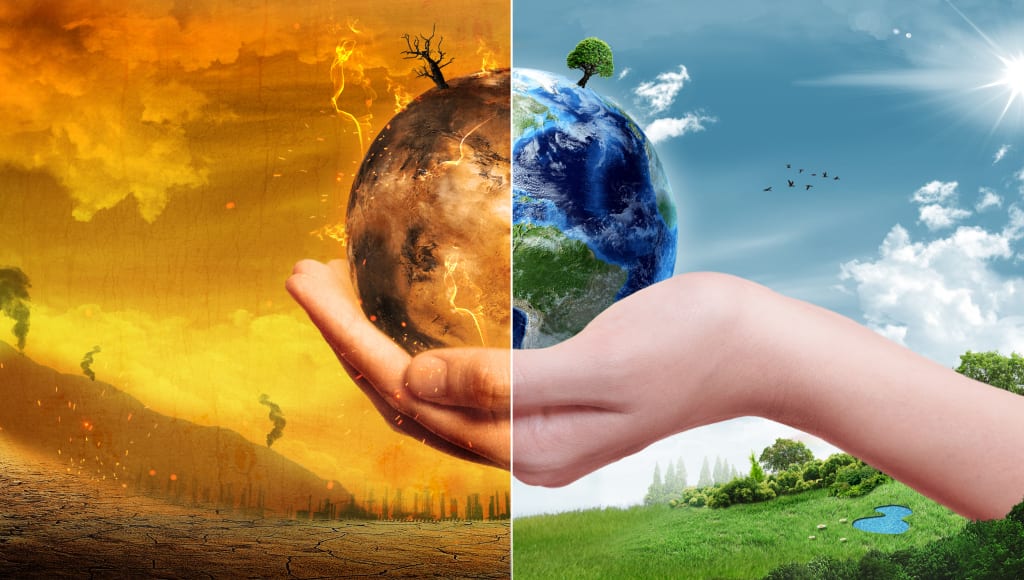
Global warming, a pressing environmental issue of our time, refers to the long-term increase in Earth's average surface temperature due to the accumulation of greenhouse gases in the atmosphere. This phenomenon is primarily driven by human activities, such as burning fossil fuels, deforestation, and industrial processes, which release large amounts of carbon dioxide (CO2), methane (CH4), and other greenhouse gases into the air.
The Earth's atmosphere acts like a blanket, allowing sunlight to enter but trapping heat that would otherwise escape into space. Greenhouse gases, including CO2, CH4, nitrous oxide (N2O), and fluorinated gases, amplify this natural greenhouse effect by preventing some of the heat from radiating back into space. While this natural greenhouse effect is essential for maintaining a habitable planet, the excessive accumulation of these gases is leading to an enhanced greenhouse effect, causing global temperatures to rise at an alarming rate.
One of the primary contributors to global warming is the burning of fossil fuels, such as coal, oil, and natural gas, for energy production and transportation. These activities release vast amounts of CO2 into the atmosphere, which accumulates over time and forms a thick layer that traps heat. The widespread use of fossil fuels has led to a substantial increase in CO2 levels, from around 280 parts per million (ppm) in the pre-industrial era to over 415 ppm today.
Deforestation, another significant factor in global warming, exacerbates the issue by reducing the Earth's capacity to absorb CO2. Trees act as carbon sinks, absorbing CO2 from the atmosphere during photosynthesis and storing it in their biomass. When forests are cleared for agriculture, urban development, or logging, this stored carbon is released back into the atmosphere, intensifying the greenhouse effect.
Methane, though present in smaller quantities than CO2, is an even more potent greenhouse gas. It is released from various sources, including livestock digestion, rice paddies, and landfills. Additionally, the thawing of permafrost due to rising temperatures can release large amounts of methane previously trapped in the frozen ground, creating a feedback loop that further accelerates global warming.
The consequences of global warming are far-reaching and have the potential to disrupt ecosystems, weather patterns, sea levels, and human societies. Rising temperatures can lead to more frequent and severe heatwaves, droughts, and wildfires, endangering both human and animal populations. Changing precipitation patterns can lead to altered agricultural yields, impacting food security. Furthermore, the melting of glaciers and polar ice caps contributes to rising sea levels, threatening coastal communities and ecosystems.
To address global warming, international efforts such as the Paris Agreement have been established to mitigate its impacts. The Paris Agreement, adopted in 2015, aims to limit global warming to well below 2 degrees Celsius above pre-industrial levels and pursue efforts to limit it to 1.5 degrees Celsius. Countries that are party to the agreement commit to reducing their greenhouse gas emissions and enhancing their climate resilience.
Transitioning to renewable energy sources, such as solar, wind, and hydroelectric power, is a crucial step in mitigating global warming. These sources produce little to no greenhouse gas emissions during operation, reducing the overall carbon footprint. In addition, energy efficiency measures, sustainable land management practices, and reforestation efforts play essential roles in curbing emissions.
Individual actions also contribute to addressing global warming. Choices such as using energy-efficient appliances, reducing meat consumption, using public transportation or carpooling, and minimizing waste can collectively make a significant impact. Raising awareness and advocating for climate-friendly policies are vital steps toward inspiring change on a broader scale.
In conclusion, global warming presents a formidable challenge to the planet's ecosystems, weather patterns, and human societies. Human activities, particularly the burning of fossil fuels and deforestation, have led to the accumulation of greenhouse gases in the atmosphere, causing temperatures to rise at an alarming rate. The consequences of global warming are already evident in the form of extreme weather events, rising sea levels, and ecological disruptions. Addressing this issue requires international cooperation, policy initiatives, and individual actions aimed at reducing greenhouse gas emissions and transitioning to sustainable energy sources. As we move forward, it is imperative that societies around the world take decisive steps to mitigate global warming's impacts and ensure a habitable planet for future generations.





Comments
There are no comments for this story
Be the first to respond and start the conversation.